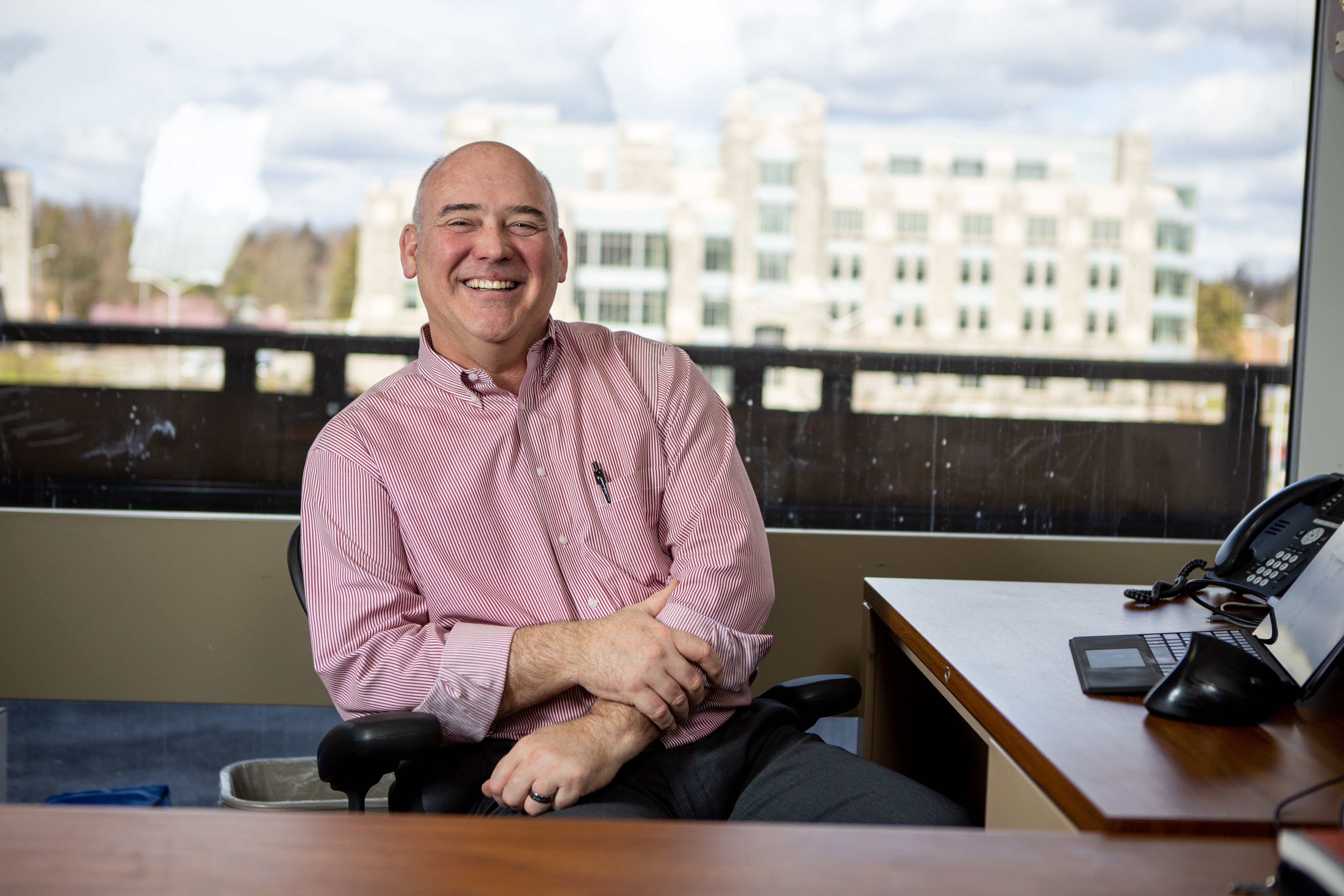Scot Ransbottom: Overseeing the MDE

Introducing Scot Ransbottom
- Joined ECE November 2018
- Chief of Staff and Deputy Chief Information Officer, Virginia Tech, 2015-2018
- Deputy Director, Information Security Lab, Virginia Tech, 2014-2015
- Retired from the military after 27 years of service, 2013
- Ph.D., computer engineering, Virginia Tech, 2004
- M.S., computer science, Duke University, 1997
- B.S.E.E., electrical engineering, Ohio University, 1988
Overseeing the MDE
As director of Design Projects and a collegiate associate professor teaching the Major Design Experience (MDE) and one of the new sophomore ECE courses, Scot Ransbottom is at the forefront of major innovations in the structure and curriculum of ECE’s undergraduate program.
When he was appointed to lead the MDE in 2018, ECE was involved with the ABET accreditation process. “It’s frequently the case that you want to come in slow, observe, and see what’s happening before you affect change. That was not a luxury I was afforded. I came in and immediately made changes to an excellent MDE program to address minor gaps in data collection to ensure that we were fully prepared,” he explains, adding, “everyone reacted well.” When ABET gave its report, it singled out the MDE program as one of ECE’s strengths.
Ransbottom’s enthusiasm for the program and admiration for the department’s students is palpable. “The students spend three or four years learning a lot about engineering, but the MDE is an opportunity for them to come together as a team, work for a real customer, and perform engineering at scale, in context, and over a long enough time that they benefit or struggle based on their challenges and individual decisions,” he says.
There are other advantages to companies employing student teams also—their lack of experience gives them an edge on finding creative solutions that seasoned engineers might dismiss. “The students are unabashed; they don’t know what they don’t know, so anything is possible,” notes Ransbottom. “Some sponsors and clients come to us just to see what student teams will come up with. An experienced team of engineers is going to be more deliberate and defined in how they tackle their challenges.”
At the same time, Ransbottom emphasizes to MDE students that “a failed experiment is frequently the best way to learn.” That might be hard to see in the moment, but his focus is on the process the students develop to move forward and design a solution to a concrete problem. Refining and improving that process, which students can take and apply to different projects throughout their careers, is the real aim of the MDE.
The next challenge for the MDE and Ransbottom is scaling up to accommodate expansion of the program as Virginia Tech adds new undergraduates. As ECE grows, the MDE has to ensure that each individual student participates in their design project, is exposed to the problem-solving process, and can be proud of their contribution regardless of the outcome. “So far the feedback from the students is positive,” Ransbottom notes.
Forming New Courses, New Faculty Roles
The strength of the program, as he sees it, also lies in how the MDE echoes students’ early experiences in the department. Ransbottom taught one of the first redesigned sophomore courses and explains that this early course uses the same concept scaffolding and assignment structure they expect students to work with in the MDE. The sophomore courses have been deliberately designed, he explains, “so that when they come back in senior year and converge again as members of a team, it is easier for them to find a common language or common approaches because they have those shared experiences.”
In addition to shaping these new programs, Ransbottom has been working to form and articulate the role of the new collegiate faculty. While teaching, leading the MDE, and overseeing the research of a masters and a Ph.D. student, he is participating in faculty searches and helping students, colleagues, and candidates understand the expectations and strengths of the collegiate faculty.
A Mentor with a Powerful Story
Ransbottom was the first person in his family to go to college, which has shaped how he teaches and advises students. “I look for situations where a student might not have context to understand or anticipate something they encounter in the classroom or on campus,” he explains, “and I try to ensure that those students know that they are not alone and that everyone didn't know that, at some point.”
Before joining ECE, Ransbottom served for 27 years in the U.S. military. He was an assistant professor of electrical engineering and computer science at the United States Military Academy, where he also had multiple administrative roles. Over his career, he held several leadership positions within the military, including director of operations for U.S. Army Central communications in Southwest Asia. In this position, he led the prioritization and programming of over $250 million in communications projects over a 26-nation region including Iraq and Afghanistan.
“I try to leverage my military background,” he explains, “to provide examples from government or large business that reinforce or illuminate a concept. I frequently reflect that my most challenging experiences have helped me understand myself and have driven me to perform under adversity.”


